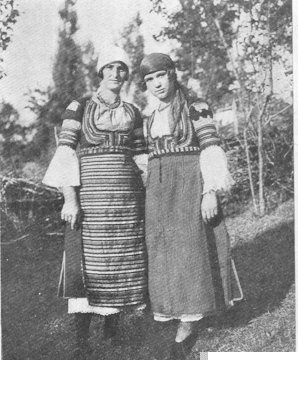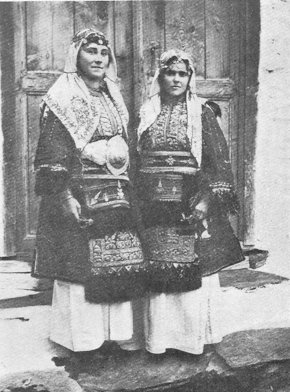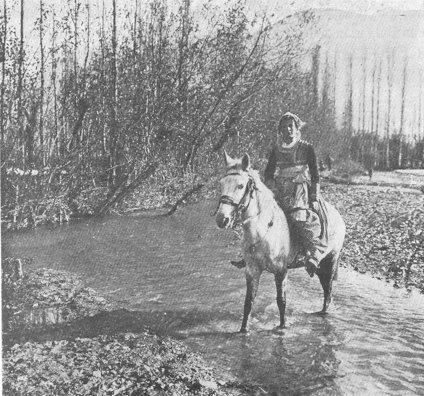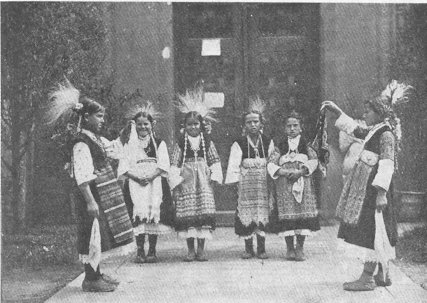

CHAPTER III
The People
B.
The Bulgarians are a tense people. Their devotions have a grim and tragic aspect. They take things in earnest. They give and demand the last measure of devotion. In a struggle for a cause neither their own nor others' lives are of supreme importance. They readily listen to Messianic voices and when in response to them they join the ranks of world reformers and enter Armageddon they do not ask nor give mercy.
These are undoubtedly Slavic traits — Slavic traits, strongly tinged with a Puritan grimness and a Hebrew love of cosmic dimensions. This energy and seriousness, this insurgent individualism, tempered with an attachment to community effort, this hardheaded practicality, coupled with a sweeping, supernational idealism of an irresistible imperativeness are qualities which, when they find their proper equilibrium, bring strength, discipline, progress and prosperity.
* * *
They foster a virility, which in spite of wars and a certain amount of internal disorganization, has assured a steady and comparatively rapid growth of the Bulgarian nation. Since Bulgaria became a free principality fifty years ago it has more than doubled its population, raising it from 2,823,211 to 5,766,000. The population density has increased from 75 persons per square mile to 143. This means that in respect to density of population Bulgaria is the twelfth European country, following Portugal and preceding Rumania. In this respect she may be compared to the state of Ohio. Every year she has an average increase of 60,731 persons or of 1 %.
In 1926, 203,712 persons were born in Bulgaria and 93,409 died leaving a gain of 110,303. Only Russia has a higher birth rate while three European countries have higher death rates. In Bulgaria there are 12,000 more men than women and 10,000 more boy babies are born annually than girl babies.
Most adult Bulgarians are married: 71% of the men above 15 years of
age and 78% of the women. Almost all of the widowers marry again but the
widows remain single. This is not due to religious or sentimental considerations
but to the fact that it is not easy for a woman with children to find a
second husband, while women are glad to marry a man even though he has
children. The deciding motive in most such cases is an economic one; women
marry even when making a bad match, for if single it is difficult for them
to support themselves in a Bulgarian village. In the whole of Bulgaria,
with a population of nearly 6,000,000 people, there are less than 6000
divorces. Marriage is for life and even when not happy ever after the victims
accept their lot as final and try to make the best of it. Sixty per cent
of all the weddings take place during the winter and late autumn, nearly
a quarter of them during the month of February alone. This is due largely
to the fact that weddings are festive occasions, requiring a good deal
of leisure and the peasants are the freest during the winter months. The
rush to the altar during February is caused by the approaching Easter fast
when weddings are not performed. Most brides and grooms are over twenty
years old at marriage.
 |
 |
| Ready for the dance | For state occasions |
There are comparatively few illegitimate children in Bulgaria, about 12 to a thousand legitimate ones. The average annual number has been doubled during the last twenty years, a sinister by-product of advancing civilization.
Bulgarian families are fairly large, the average number of persons in each household being five. About a tenth of the inhabitants, however, belong to households of more than ten members. In past decades it was customary in the villages for married sons and their families to live in the same yard and eat at the same table with the parents and grandparents, forming a common establishment and drawing support from a common purse. This custom, however, is being discontinued and now grown sons are inclined to demand that their share of the family property be turned over to them so that on marriage they may start a separate domestic establishment. In consequence the average size of households has appreciably decreased during the last thirty years, although the birth rate has fallen but very little.
There is a larger proportionate number of very old people in Bulgaria than in almost any other land. Last year there were 15,095 people 90 years old or more, while there are many who have lived more than 100 years. The cases of 158 centenarians have recently been carefully studied. More of them are men than women and a dozen are over 105 years of age.
* * *

Not a riding costume. Some of the Bulgarian women in
Macedonia regularly wear bloomers
Practically all of the Bulgarian people are adherents of the Eastern Orthodox Church, which is supported by the state like every other official institution, although it is directed by an independent Holy Synod, composed of four Bishops, who are elected by their fellow Bishops, eighteen in number, and serve for four years. These members of the Holy Synod, who minister to large dioceses situated in various parts of Bulgaria, at the seats of which they live, convene three times a year, at the beautiful Synodal Palace in Sofia, to consider the affairs of the church. The Eastern Orthodox form of Christianity is the one which prevails in Russia, Rumania, Serbia, Greece, Asia Minor and northern Africa, having about 146,000,000 adherents as compared to 331,500.000 Catholics and 206,900,000 Protestants. This church tends to emphasize mysticism and the predominance of the divine in mundane spheres. It stresses beautiful music and the participation of the worshipers in the impressive liturgies and in church affairs. The Bulgarian Orthodox Church is still considered schismatic because of the manner it freed itself from Greek domination in 1870, but this schism has been virtually healed as far as the non-Greek part of the Orthodox world is concerned and Bulgarian delegates attend practically all international Orthodox Conferences. There are 2,280 priests in the country and 2,939 Orthodox Church buildings as well as 103 monasteries.
There are also 34,072 Catholics in Bulgaria and 6,000 Protestants. Both of these forms of Christianity were brought to the country by foreign missionaries and their clergy still receive liberal support from abroad. Protestantism came from America seventy five years ago and although it has failed to become self sustaining and is not advancing appreciably has exerted a very wholesome influence upon the Bulgarians by bringing many of them into touch with the best things in the western world and by stimulating the progress of the state church.
There are 690,734 Mohammedans in Bulgaria of which 520,339 are Turks, a few are Gypsies and 88,339 Turkized Bulgarians, called Pomacks. The Turks, generally speaking, are the most backward elements in the country. They are all peasants and for the most part without intelligent leaders. The vast majority of them are still illiterate and although fifty years age they comprised the dominant race they have by no means been able to keep pace with the Bulgarians. So far they are a negligible element in the social, political and cultural life of the country, in spite of the fact that they form more than 10% of the total population. And strange to say, most backward of all the so called Turks are the Pomacks who in reality are pure Bulgarians. They are a hardy, primitive mountain group that accepted Islam after the Turkish conquerors swept over the Balkans as a result of relentless persecution and ever since have been the most fanatical followers of the prophet. Most of them are still illiterate and practically all of them are completely unacquainted with modem ways of living. They are found in the wildest parts of the Rhodope Mountains, where they dwell in small squalid villages and subsist by raising stock, working in the forests and cultivating poor, rocky fields. The only language they know is Bulgarian, but they resist all attempts at Christianization and during Turkish supremacy were noted for their fierce persecution of their Bulgarian Christian neighbors.

If these little girls or their sisters come into your
yard and sing for you on Lazar's Day in the spring you will have good luck
and excellent harvests
The 60,000 Rumanians in Bulgaria live mostly in the northwest corner of the country whither they migrated many decades ago, crossing the Danube from Rumania to escape persecution and oppression. It is very interesting to note that at times scores of thousands of Bulgarians have fled north across the Danube to seek refuge and lands in Rumania while thousands of Rumanians have fled south across the Danube to seek a better life in Bulgaria. It is these frequent migrations of large groups of refugee colonists that have made the nationality complexion of the Balkans so extremely intricate. These Rumanians in northwest Bulgaria are industrious, peaceable peasants, who know Bulgarian and though retaining a consciousness of their relationship with Rumania, constitute a useful and loyal element. There are also a number of Rumanian nomads, tending flocks in the southern Bulgarian mountains. They constitute part of a hardy, primitive, gifted, radical group, which has given brilliant statesmen and scholars to every Balkan nation and claims descent from ancient Roman colonists. They live from their sheep and horses, dwell half the year in tents in the mountains and are the most picturesque people left in Bulgaria.
The Greeks in Bulgaria are a remnant. For centuries this country, as other Balkan lands, was under the spiritual and economic domination of the Greeks who occupied most of the best trading centers, managed the church, and even conducted the schools. However, after the Bulgarians attained their cultural and political independence they made it rather uncomfortable for some of the Greeks whose pretentious domination they had resented and in consequence many of them migrated. Recently also there has been another rather extensive migration of Greeks, in conformity with a Bulgaro-Greek convention for the exchange of populations, so that at present their number in Bulgaria does not exceed 40,000. As everywhere in the world, most of them are enterprising and successful merchants, but others are peaceful and progressive peasants.
The most advanced racial group in Bulgaria is that of the Jews. They are of Spanish origin, live almost exclusively in the cities, are comparatively well educated, universally enterprising and almost always model citizens. They are accorded all civil and cultural rights by the Bulgarian state to which they are sincerely loyal, filling many places of responsibility with ability and devotion.
With the single exception of the Turks, Bulgaria has no large minority
group while the Bulgarian people themselves are very compact. One does
not meet among them the wide differences in languages and customs which
are found among the various groups making up the French nation or the German
people. There are, to be sure, rather obdurate Shopes from south-west Bulgaria,
volatile Thracians from the southeast, Macedonian Bulgarians from the southwest
and what we might call the classical Bulgarians from Tirnovo, while there
are also interesting differences between the mountain and plain types.
But the Bulgarians, on the whole, constitute an exceptionally uniform people
throughout the entire stretch of territory which they occupy, from the
town of Bolgrad in Eastern Rumania clear across the Balkan Peninsula to
Vodina in northwestern Greece. The blows of many centuries have welded
them into a compact unit.
[Previous] [Next]
[Back to Index]